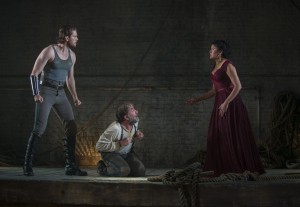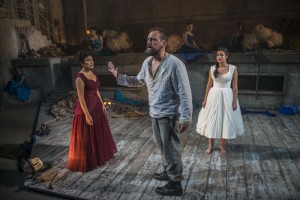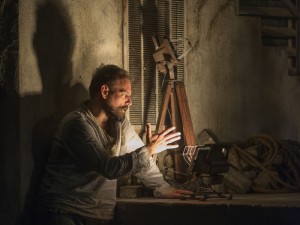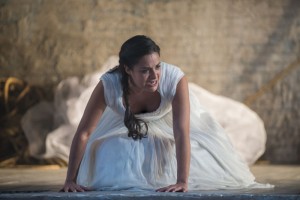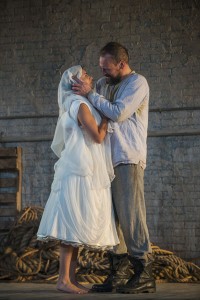AULIS WELL AT THE COURT THEATRE
With its new production of Euripides’ Iphigenia in Aulis, Court Theatre embarks upon an ambitious three-year venture: to present a trilogy of Greek tragedies chronicling the House of Atreus. Guided by the scholarship of translator Nicholas Rudall (founding artistic director of Court Theatre from 1971 to 1994), director Charles Newell has crafted a powerful beginning in an Iphigenia that seems at once dream-like and achingly real. His respect for the play’s ancient origins is clear in everything from the tiered set to the music and movement of the chorus, and yet the production never feels stale. Rather, Newell’s deft handling of the play’s emotional beats brings the story into a distinctly contemporary context.
Aulis is still. Not a bird sings, not a breath of wind stirs the sails of the Greek navy stagnating in the harbor. The soldiers themselves are unkempt, unshaven and visibly filthy – thanks to Jacqueline Firkins’ thoughtful costume design. Even Agamemnon, a commanding Mark L. Montgomery, is disheveled, his robe hanging loose about his shoulders. He and his men have been waiting for weeks for the favorable wind that will allow them to sail for Troy, where Paris has taken Helen, the wife of Agamemnon’s brother Menelaus.
Yet the gods will not grant the Greeks a fair wind until the goddess Artemis, patroness of Aulis, has been appeased with a sacrifice – Agamemnon’s daughter, Iphigenia. Agamemnon has already sent a letter to his wife, Clytemnestra, asking that Iphigenia be sent to Aulis in order to wed famed soldier Achilles, but now he’s having second thoughts. He sends a slave, the subtly witty Christopher Donahue, with a second letter contradicting the lie, but the slave is intercepted by Menelaus (Michael Huftile), and the letter stolen.
It is too late; Iphigenia arrives at Aulis with her mother and infant brother, overjoyed at the prospect of a wedding. When Clytemnestra learns the truth, she is horrified, and tries to convince her husband not to kill their child. When this fails, she turns to Achilles, played with enthusiastic bravado by Jordan Brown. He swears that he will protect Iphigenia, and chorus and audience breathe a sigh of relief.
But rumor travels quickly among bored soldiers, and soon the Greeks learn the real reason for Iphigenia’s arrival. Demanding her death, they turn against Achilles when he tries to protect his would-be bride. Outnumbered, Achilles flies to Iphigenia’s side, swearing loyalty. But the girl has already begged her father for life, and realizes now that the glory of Greece depends on her sacrifice. She turns Achilles away, comforts her mother, then runs off in search of her father and her death. Agamemnon sacrifices her to the goddess Artemis, and immediately there is the sound of rushing wind. The sails pull taut, the waves lap at the hulls. The Greeks are free to sail.
Though the men of the cast are strong, it is the women who make this production so dazzling. Stephanie Andrea Barron is a stunning Iphigenia, caught in the threshold between childhood and adolescence. Barron’s wide-eyed optimism is immensely lovable, and even her tragic monologues are tempered with innocence. Sandra Marquez’s Clytemnestra is the perfect counterpart to her daughter’s gentleness. Elegant and regal, Marquez commands the stage, her very posture suggesting that she is used to being obeyed. Her performance is fearless, every moment committed to with complete honesty. If Marquez’ Clytemnestra is indeed the role model for Barron’s Iphigenia, then the young girl’s courage can come as no surprise.
Kasey Alfonso, Jeanne T. Arrigo, Emjoy Gavino, Tania Richard, Adrienne Walker, and Tracy Walsh are a compelling chorus, using music and movement to provide context for the action. Though each member of the chorus is unique, the actresses perform with a stylized physical vocabulary that enables them to act as one. This vocabulary, reminiscent of religious rituals, makes the world of the play more vivid, and the chorus’s frequent presence downstage allows them to set the tone of a scene without ever speaking a line.
While Greek tragedy can sometimes feel pedantic and melodramatic, Newell’s Iphigenia is anything but. By turns sardonic, optimistic, and witty, the play provides a fresh perspective on an age-old story.
Iphigenia in Aulis
Court Theatre, 5535 S. Ellis Ave.
Wed and Thurs at 7:30; Fri at 8;
Sat at 3 & 8; Sun at 2:30 & 7:30
ends on December 7, 2014
for tickets, call 773.753.4472 or visit Court Theatre
for more shows, visit Theatre in Chicago



